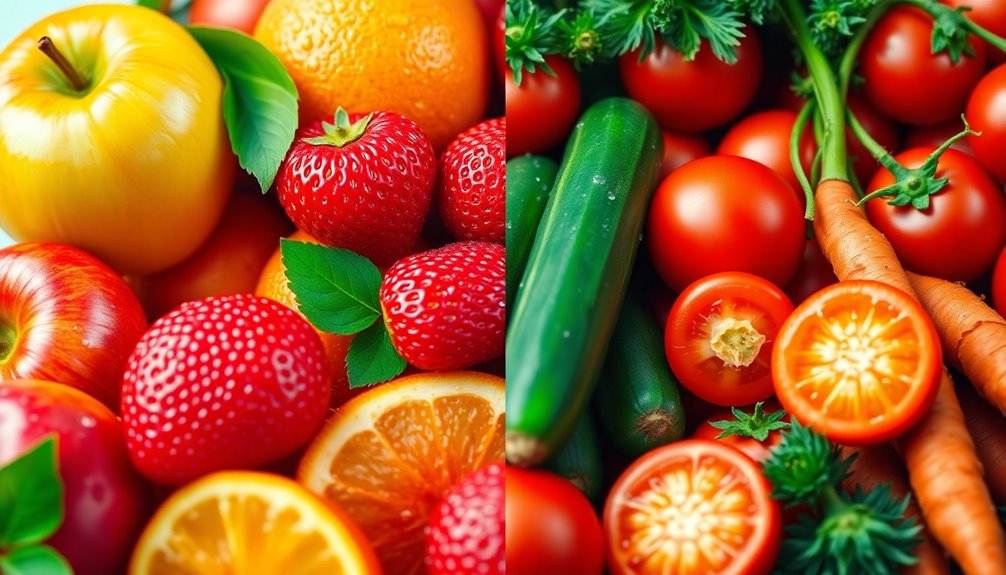Eating healthy fats can transform your body by boosting metabolism and promoting fat loss. High-fat diets help reduce visceral fat while increasing lean mass, which lowers your risk of heart disease and diabetes. Incorporating unsaturated fats from sources like avocados, nuts, and grass-fed meats can improve hormone health and decrease inflammation. To maximize these benefits, combine your diet with strength training and sufficient protein intake. This simple change not only enhances your physical appearance but also supports overall well-being. There's so much more to explore about how to effectively implement this strategy for lasting change!
Key Takeaways
- Adopting a high-fat diet can improve body composition by reducing fat mass and increasing lean muscle over time.
- Healthy fats, like those from avocados and nuts, lower inflammation and support overall health.
- Incorporating sufficient protein and fiber promotes muscle growth and enhances satiety, aiding in fat loss.
- Regular strength training combined with a high-fat diet can boost fat burning and improve muscle retention.
- Focusing on whole, nutrient-dense foods while limiting refined grains can lead to sustainable weight loss and better energy levels.
Benefits of High-Fat Diets

When it comes to transforming your body, adopting a high-fat diet can offer remarkable benefits. One of the most significant advantages is the improvement in body composition. You'll notice that fat mass decreases while lean mass increases over a 16-week period. This study found that participants experienced a substantial reduction in fat mass and an increase in lean mass.
If you're dealing with obesity, a low-carb, high-fat diet can lead to a substantial reduction in visceral fat, which is linked to serious health risks.
Additionally, high-fat diets can facilitate significant weight loss, particularly when combined with low-carb intake. This transformation comes with the added bonus of lowering your risk for heart disease and diabetes.
You might also experience reduced inflammation, as blood levels of inflammatory cytokines drop significantly.
You'll find that your blood pressure and triglyceride levels improve too. With a focus on unsaturated fats and avoiding trans fats, you can optimize these health benefits.
Overall, high-fat diets can provide you with better satiety, boost energy levels, and improve your mental health.
As you embrace this dietary change, remember that balance is key, and consulting with a doctor is wise if you have underlying health concerns.
Enhancing Muscle Gain

While high-fat diets can offer benefits for weight loss and overall health, they mightn't be the best choice for maximizing muscle gain. High-fat consumption can lower your insulin levels, which are crucial for activating muscle growth pathways.
Additionally, if you're relying heavily on fats, you may find your energy levels drop during training, compromising your workout intensity and, ultimately, your muscle growth. A high-fat diet can also deplete your glycogen stores, which are essential for powering workouts and supporting recovery. Without adequate glycogen, your muscles might struggle to process nutrients effectively, leading to long-term issues like reduced glucose oxidation and insulin resistance.
To enhance muscle gain, focus on a balanced diet that includes sufficient carbohydrates. Higher carbohydrate intake not only helps maintain glycogen levels but also supports insulin production, both of which are vital for muscle growth.
Make sure you're getting enough calories and protein—around 1g per pound of body weight—and distribute your protein intake evenly throughout the day. Optimize your meals around workouts, combining carbs and protein to fuel recovery and promote muscle adaptation.
This balanced approach will set you up for success in your muscle-building journey.
Effective Fat Loss Strategies

To achieve effective fat loss, it's crucial to implement a combination of dietary changes, exercise routines, and lifestyle modifications.
Start by replacing refined grains with whole grains like quinoa and oats, which help reduce belly fat. Focus on balanced meals consisting of protein, healthy fats, and plenty of vegetables to maintain muscle mass while losing weight. Increasing your fiber intake through fruits, grains, and legumes can help you feel fuller, supporting your weight loss efforts. Additionally, choosing whole grains instead of refined grains can promote better weight management. Incorporating low carb foods into your meals can further enhance fat loss by limiting unnecessary carbohydrates. Eating a diet rich in fruits and vegetables can also provide essential nutrients that support overall health. Furthermore, incorporating chia seeds into your diet can enhance your fiber intake, which aids in digestion and satiety.
Incorporate strength training to build muscle and reduce body fat percentage—aim for at least 1.46% reduction over four weeks. Combine cardio workouts with weight training for optimal fat burning. Aim for 30 to 60 minutes of moderate to vigorous exercise nearly every day.
Lifestyle modifications are also essential. Ensure you get at least 7 hours of quality sleep and stay hydrated to enhance fat burning.
Practice mindful eating to understand your body's hunger signals and avoid overeating. Lastly, consider using behavioral tools like fidgeting to increase your daily activity levels.
Importance of Reproductive Health

Achieving effective fat loss is only one aspect of overall wellness; reproductive health plays a significant role in your well-being too. A balanced diet rich in fruits, vegetables, whole grains, and lean proteins can significantly enhance your reproductive health and improve your chances of conception. Specific nutrients like folic acid, omega-3 fatty acids, and antioxidants are crucial for supporting fertility. Incorporating healthy fats, such as those found in avocados, nuts, and olive oil, is essential for hormone health and reproductive function. healthy fats are also linked to improved sperm quality, which can further enhance fertility outcomes. Including chia seeds in your diet can also be beneficial due to their high omega-3 content and ability to support digestive health. Additionally, ensuring proper indoor air quality through eco-friendly practices can contribute to a healthier living environment, which indirectly supports reproductive health. Furthermore, foods rich in antioxidants can help reduce oxidative stress, promoting better reproductive health. Consuming foods high in fiber like chia seeds can also aid in maintaining a healthy weight, further supporting reproductive health.
Maintaining a healthy Body Mass Index (BMI) is vital for fertility. Keeping your weight within the normal range optimizes reproductive function. Weight management strategies, including regular physical activity and mindful eating, can positively impact fertility outcomes for both men and women. Obesity or being underweight can disrupt hormonal balance, negatively affecting your fertility. Additionally, stress management through practices like yoga or meditation can help reduce stress that could hinder your reproductive health. Access to contraceptive and reproductive services is also crucial to ensure you make informed choices about your reproductive health as your needs evolve over time.
Prioritizing these aspects can lead to improved overall wellness.
Metabolic Adaptations Explained

Understanding metabolic adaptations is crucial for anyone looking to optimize their weight loss journey. When you change your diet, your body undergoes cellular and biochemical adaptations that influence how it processes fat and carbohydrates. These shifts can alter hormone levels and signaling molecules, impacting gene expression related to metabolism.
As you lose weight, your Total Daily Energy Expenditure (TDEE) typically decreases. This includes drops in your Resting Metabolic Rate (RMR) and non-exercise activity thermogenesis (NEAT). Your body becomes more efficient at conserving energy, which can lead to weight loss plateaus, even if you're maintaining a caloric deficit. This phenomenon is a reflection of metabolic adaptation's role in energy conservation during periods of reduced caloric intake.
Additionally, weight loss often results in a decrease in fat-free mass, which can trigger an increase in appetite. This phenomenon, combined with adaptive thermogenesis, can make it feel more challenging to continue losing weight.
It's essential to remember that metabolic adaptation is an adjustable response, not a permanent condition. By understanding these changes, you can strategize your approach to weight loss, keeping in mind that your body will naturally adapt as you modify your caloric intake and activity levels.
Practical Tips for Implementation

Implementing healthy cooking and eating habits can drastically transform your body and overall well-being. Start by choosing the right oils for cooking; opt for vegetable oils like olive or canola instead of butter or margarine. Trim any visible fat from meats and remove skin from poultry before cooking. Incorporating coconut oil(high in medium-chain triglycerides) can enhance your fat intake and support ketosis if you are following a keto diet. Additionally, understanding how to balance your fat intake with other essential nutrients can further improve your diet. Regular consumption of herbal teas may also support your overall wellness journey.
Using essential oils, such as peppermint oil, can provide additional health benefits that complement your dietary changes.
Try baking, broiling, or roasting instead of frying to cut back on added fats. In your grocery shopping, select whole, full-fat ingredients rather than low-fat or fat-free options, such as full-fat dairy and whole eggs. Limit red meat to three servings a week, and incorporate plant-based proteins like beans, lentils, and tofu. Moderate consumption of nuts is also beneficial for maintaining a healthy fat intake.
When preparing meals, use herbs or no-oil marinades for flavor and keep vegetables light with lemon juice or a spritz of olive oil. For snacks, include healthy fats like cheese, nuts, or hard-boiled eggs.
When recipe planning, consider adding vegetables and beans to dishes like stews or curries to increase their volume without adding excessive fat. Lastly, measure your oils and use sprays to control portions, ensuring you maintain a balanced approach to fat intake.
Foods to Boost Your Diet

Incorporating a variety of nutrient-dense foods into your diet can significantly enhance your health and support your transformation journey. Start by including foods high in healthy fats, like avocado, which is packed with monounsaturated fats that help reduce bad cholesterol. Additionally, focusing on age-appropriate discipline methods can help reinforce healthy eating habits in children. Regular consumption of essential oils for hair growth can also support overall health and wellness, enhancing the benefits of a nutrient-rich diet.
Nuts such as walnuts, almonds, and pistachios are excellent for providing protein, fiber, and essential minerals. It's also worth noting that antioxidants found in foods like nuts can contribute to overall health and well-being. Don't forget about seeds; pumpkin, chia, and sesame seeds offer healthy fats along with omega-3 and omega-6 fatty acids. Chia seeds, in particular, are known for their high nutrient density, making them an excellent addition to your meals.
To replace saturated fats, choose grass-fed meats and wild-caught fish, ensuring you avoid harmful hormones and pollutants. Incorporate whole grains instead of gluten starches to stabilize blood sugar levels. Unsaturated fats are recommended as healthier alternatives to replace saturated fats for better health.
Healthy oils like extra-virgin olive oil can be used for cooking, while leafy vegetables should replace starchy options in your meals.
For snacking, opt for raw nuts, add avocado to your salads, or enjoy olives instead of potato chips. Nut butters like almond or cashew can serve as delicious, healthy snacks.
Finally, consider reduced-fat yogurt parfaits or frozen yogurt for dessert without the guilt. By making these simple changes, you'll boost your diet and your overall health.
Frequently Asked Questions
How Does Fat Intake Affect Mood and Mental Health?
Fat intake significantly affects your mood and mental health. High saturated fat diets can lead to depression and anxiety by disrupting gut bacteria and altering brain signaling pathways.
In contrast, unsaturated fats, like omega-3s, can improve mood and support brain function. Balancing your fat intake is crucial; too little fat can also negatively impact your mood.
Keep an eye on the types of fats you consume for better emotional well-being.
Can High-Fat Diets Worsen Cholesterol Levels for Everyone?
High-fat diets can impact cholesterol levels differently for everyone. If you consume saturated fats, you might see an increase in both total and LDL cholesterol.
However, if you focus on healthier fats, like monounsaturated fats, you could improve your HDL cholesterol and lower triglycerides.
It's essential to monitor your overall fat intake and choose the right types, as your individual response can vary significantly based on your overall dietary habits and health status.
What Are Common Misconceptions About Fat in Diets?
Many misconceptions about fat in diets can lead you astray. You might think all fats are unhealthy, but healthy fats like those in avocados and nuts are vital for your overall health.
It's not true that your body doesn't need any fat; it's essential for energy and hormone production. Plus, eating fats doesn't automatically cause weight gain; balance and moderation matter more than the fat content alone.
Prioritizing healthy fats is key!
Are There Specific Fats to Avoid Entirely?
Yes, there are specific fats you should avoid entirely.
Trans fats, often found in partially hydrogenated oils, are particularly harmful and linked to heart disease and insulin resistance. It's best to steer clear of fried foods, margarine, and many processed snacks that contain these fats.
Saturated fats should also be limited, especially from fatty meats and full-fat dairy.
Focusing on healthier unsaturated fats will support your overall health.
How Do Individual Body Types Respond to High-Fat Diets?
Individual body types respond differently to high-fat diets. If you're an ectomorph, you'll thrive on complex carbohydrates and moderate protein instead of high fats.
Mesomorphs perform best with a balanced intake of macronutrients, while endomorphs benefit from high-fat diets to manage insulin levels and promote satiety.
Understanding your body type helps tailor your diet, ensuring you get the nutrients you need without compromising your health or fitness goals.
Conclusion
Incorporating healthy fats into your diet can truly transform your body and overall health. By focusing on high-fat foods, you'll enhance muscle gain, support effective fat loss, and improve reproductive health. Embrace the metabolic adaptations that come with this shift, and you'll see incredible results. Remember, it's all about balance and making smart choices. So, start implementing these practical tips today, and watch as your body thrives with the power of fat!










